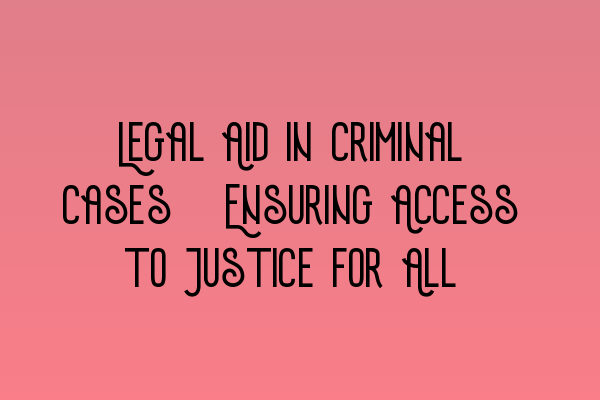Legal Aid in Criminal Cases: Ensuring Access to Justice for All
Legal aid plays a crucial role in ensuring access to justice for all individuals, regardless of their financial circumstances. In criminal cases, where defendants are often facing serious charges that can have life-altering consequences, access to quality legal representation becomes even more essential. This blog post will explore the importance of legal aid in criminal cases and how it helps individuals navigate the complex legal system.
The Role of Legal Aid
Legal aid provides financial assistance to individuals who cannot afford to pay for legal representation. It ensures that everyone has equal access to justice, regardless of their socio-economic background. In criminal cases, legal aid allows defendants to have a fair trial and defend themselves against the charges they are facing.
Without legal aid, individuals without financial means may be forced to represent themselves, which can lead to significant disadvantages. Legal proceedings can be highly complicated, and without proper legal knowledge and expertise, defendants may struggle to navigate the complexities of the legal system.
Legal aid also helps to level the playing field, ensuring that even those who are less privileged can receive the same quality of representation as those who can afford private legal services. This promotes fairness and prevents a justice system that is biased towards the wealthy.
The Benefits of Legal Aid in Criminal Cases
Legal aid in criminal cases offers several benefits that contribute to a fair and just legal system:
1. Protecting the Rights of the Accused: Legal aid ensures that defendants have access to qualified legal professionals who can protect their rights and ensure fair treatment throughout the criminal justice process.
2. Providing Adequate Preparation: Legal aid enables defendants to receive comprehensive legal advice and support, ensuring they are adequately prepared for their case. This includes reviewing evidence, gathering witnesses, and constructing effective legal arguments.
3. Reducing Wrongful Convictions: Legal representation provided through legal aid helps minimize the possibility of wrongful convictions. Lawyers can identify weaknesses in the prosecution’s case, present strong counter-arguments, and highlight any violations of the defendant’s rights.
4. Promoting Confidence in the Legal System: By providing legal aid, the justice system demonstrates its commitment to fairness and equality. This helps build trust and confidence among the public, fostering a belief that justice is attainable for all.
Challenges and Solutions
While legal aid is crucial, there are challenges associated with its implementation:
1. Funding Constraints: Limited resources often result in inadequate funding for legal aid programs. This can lead to a shortage of qualified lawyers willing to take on legal aid cases.
2. Eligibility Criteria: Strict eligibility criteria sometimes exclude individuals who may not meet the financial thresholds but still struggle financially to afford legal representation.
To address these challenges and ensure access to justice for all, it is essential to:
1. Increase Funding: Governments should prioritize funding for legal aid services to ensure that there are sufficient resources to provide quality legal representation.
2. Review Eligibility Criteria: Regular reviews of eligibility criteria can help ensure that individuals who genuinely need legal aid can access it, even if they fall outside the strict financial thresholds.
Conclusion
Legal aid in criminal cases is pivotal in ensuring access to justice for all individuals. It plays a crucial role in protecting the rights of the accused, providing adequate preparation, and reducing the likelihood of wrongful convictions. Despite challenges such as funding constraints and eligibility criteria, it is imperative for governments and legal organizations to prioritize and optimize legal aid services to build a fair and just legal system.
To learn more about SQE Criminal Law & Practice Law in the UK, check out our related articles:
